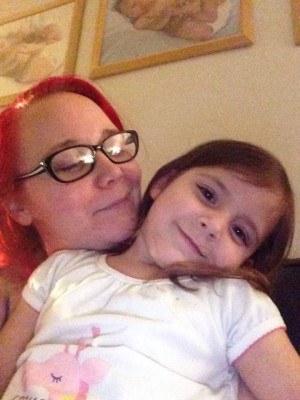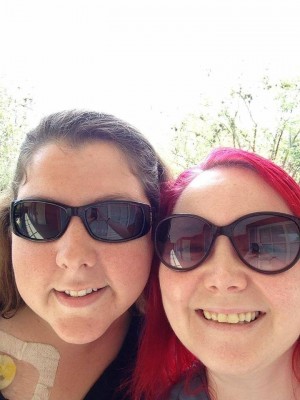Back together
This winter, when my entire city struggled under walls of ice and snow, I found myself dreaming about the beach. In my mind, I stood by the water’s edge, air warm, breeze strong off the ocean, sun warming my skin. I imagined myself looking and seeing the scar where they closed my ostomy site.
It was such an impractical dream that I didn’t really hope for fruition. I am essentially allergic to the beach – sunblock, sunlight, cold water, heat. And of course my ostomy site would never be closed. It was not even an option then. I never thought it was possible.
Three months later, I arrived at the hospital to have surgery that would reverse my ostomy and reconnect the two segments of my GI tract so that stool would pass through the rectum. It felt surreal, like at any time I would find a man behind a curtain, pulling strings.
They took me right in and every person who spoke to me knew that I had mastocytosis and that I needed premeds one hour before the procedure. They went over everything with me again to make sure it was mast cell safe. “You are the boss,” one nurse told me. “You live with this all the time, just tell us what you need.” I have waited years to hear these words, for providers to believe that.
They administered my premeds and the anesthesiologist came to give me an epidural. It was painless. They taped the line with my safe tape and lay me down. They pushed some midazolam and fentanyl and wheeled me into the operating room.
“I need to tell you something about my skin,” I said suddenly, jerking awake from my semi-unconsciousness. “My skin is really reactive and hives easily, so don’t think that it’s a sign of anaphylaxis.”
“We know,” the nurse said, nodding reassuringly. “It’s in the note you gave us for your chart. We know about your disease and we will be careful.”
And the first time in a long time, I believed it. Everyone in that room understood at least the basics of mast cell disease and our special operative concerns.
I lay back and they put a mask on my face. I breathed deeply and woke up a few hours later in the PACU.
I had an epidural with a bupivacaine PCA pump that I could push as needed to numb my abdomen. I had a hydromorphone PCA pump that I could as needed for additional pain management. I couldn’t feel any pain. It was amazing. I still reacted to the anesthesia with my typical nausea/vomiting but they were prepared for it. Frankly, it was so pleasantly different from my last major surgery that it seemed like a small price to pay.
About twelve hours after surgery, my GI tract started moving. Last time, it didn’t move for five days. This time it was moving and pushing things in the right direction. It was the best possible indication that this had worked. I couldn’t believe it.
The following day I was up walking around. (If you are having abdominal surgery and have mast cell disease, ask about an epidural. It honestly was the lynchpin here and made the pain so manageable so my mast cell reactions to pain were really minor.) I was eating the day after that. I had a couple of reactions but they were easy to control because there were orders to administer Benadryl and Pepcid IV as needed, as well as steroids if the reaction was severe.
I felt so safe. The nursing care was so good I wrote a letter detailing how amazing they were. They all asked me about my disease and diluted my Benadryl and they were just generally fantastic. Instead of spending seven days fighting for things I needed, I spent seven days managing my pain and reactions in an environment with many professionals who cared and understood that I was not just a crazy person asking for crazy things.
I came home a few days ago to my kitchen table covered in presents and cards from the mast cell community. It was so humbling. It was like Masto Christmas. There were books and movies, a huge piece of amethyst, stuffed animals, cute like knick knacks, funny cards, touching cards and pictures drawn by the masto kids. It was the perfect punctuation for this experience. I try to hold things together and to be strong at the broken places, and you guys just pulled everything together for me. I will never forget this kindness as long as I live.
One of the very difficult things about mast cell disease is that we so often have to fight for things we need to be safe. We are always ready for a fight, always on edge. We wonder if it we can keep this up. We are so tired. We just want to be safe. We want others to help us be safe.
This experience was the culmination of years of educating medical professionals and of them receiving education on mast cell disease elsewhere. This time when I said I needed Benadryl, they just got it for me. No fighting. I am the boss of my body.
I write a lot about how I see the world and how I interact with it as a mast cell patient. But in my private writings, I write about how I want the world to be, how it should be. Two weeks ago, I went to the hospital for surgery and during my stay, I realized I was living in that world. Maybe it was just for a little while, but I was there. I could hear the universe whispering to me, “You can do this. Look how far you have come.” So I’m ready to fight again if I have to, because I saw this other reality, and it was real and safe and we can make it like that everywhere if we try.
So when time goes by and it gets hard again, and I’m exhausted from advocating, I’m going to remember this. I’m going to remember this win. I’m going to remember that this safe place made it easy for me to heal and rest. I’m going to remember that this fight is how we make the rest of the world safe for all of us, not just for me, at one hospital, one time.
I’m going to remember that this tired, sick body made this incredible thing possible, and when it seems like I can’t do any more incredible things, I’ll remember that I achieved this, and that I can achieve so much more.
And when you guys are tired and sick of fighting, promise me that you’ll remember that this is possible, and that we’re all in this together. When you think you can’t do it anymore, just extend a hand to the void. We will be there to hold it and put you back together.

